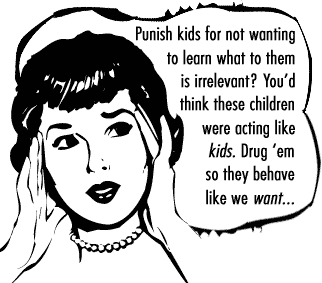 In my day job, I supervise volunteer advocates for children in foster care. I just received an email from an advocate who is concerned about the amount of medication prescribed to the teen she is working with. This teen's parents' rights were terminated when she was little and she was adopted by her grandmother. She was taken back into the system in 2003 when her grandmother passed away. This teen takes the following each day:
In my day job, I supervise volunteer advocates for children in foster care. I just received an email from an advocate who is concerned about the amount of medication prescribed to the teen she is working with. This teen's parents' rights were terminated when she was little and she was adopted by her grandmother. She was taken back into the system in 2003 when her grandmother passed away. This teen takes the following each day:- Seroquel (200 mg.) 1 tablet at bedtime
- Lamictal (25 mg.) 1 tablet 3 times daily - 8 am, 4 pm, 8 pm
- Adderall XR (30 mg) 1 table daily @ 8 am
- Guanfacine (2 mg.) 1 tablet 2 times daily - 8 am, 4 pm
- Loratadine (10 mg) 1 tablet daily
- Ranitidine (150 mg) 1 tablet 2 times daily - 8 am, 4 pm
I am not this teen's therapist, psychiatrist or even her advocate. However, this teen has asked multiple times to be taken off of her medication, and I believe the residential facility considering the possibility. My concern, along with her advocate's and other advocates I supervise, is that it seems that children in foster care are overmedicated - a concern sometimes referred to as chemical restraint. By virtue of being in foster care, these children have suffered multiple traumas and major loss along with separation and adjustment issues. Since this current regimen was put in place, this particular teen has been incredibly sleepy and her grades have been dropping. She complains about the side effects and the advocate, who has been working with her for three years has noticed a marked change. She is a zombie, but hey - at least she's not acting out anymore! But what does this mean for her life and her future?
What's in it for the residential facility, I wonder? With a little googling, I discovered a CBS article that reported that at least in Los Angeles, more medicated kids can mean more funding:
"Because most foster kids who receive drugs are classified as problem children and by contract, group homes get paid more for those kids.
'When you have a group home full of kids sleeping, you don't have to deal with them,' Walker said. 'It's a good thing for them, they get paid, they get a nice fat paycheck.'"
In all of the cases I oversee, the children are medicated starting at an early age. Sometimes I wonder if is this for the children's benefit or the adults? More often I wonder if it is the pharmaceutical companies that benefit the most1? Kids who have been traumatized are going to act out, do we control them through medication or figure out how to help them work through their trauma, grief, and loss? An article on citylimits.org reports that kids in foster care are more likely to be prescribed medication and that a University of Minnesota study found that compared to 15 percent of the general population, 35 percent of St. Louis County foster children were on psychotropics. If you take out infants in foster care, who I assume are not on psychotropics, 35% is an even larger percent of the population. I've read that kids are prescribed psychotropics as early as preschool.
I know this is a long entry (I think I could easily write a dissertation on this topic!), but I have one more comment on this issue. Last fall, I went to a panel presentation by Let's Start Inc. (pdf), a fantastic organization in St. Louis that helps "women build successful lives after incarceration". One of the women told her story which included growing up in the foster system, her struggle with substance abuse and multiple incarcerations. She eloquently spoke of when she was first prescribed psychotropic medications that "all of the mess in her head" dissipated... which, for her at least, was a logical first step to her later substance abuse. By using prescribed and illicit drugs, she was able to avoid her problems and didn't start dealing with them and really working through them until recently. She's at least 40 years old.
Check out this resource from Florida on Legal Strategies to Challenge Chemical Restraint of Children in Foster Care.
1The latest issue of Good Magazine has a short piece about the profits and patents of pharmaceutical companies, I don't have it with me right now but will try to post some of the information later today or tomorrow.




2 comments:
Wow. I am really glad you started writing.
Wow! First of all I cannot believe the amount of drugs that the teen, in which you referenced, is taking. I am also shocked at what appears to be the lack of response to her wanting to get off of some of the drugs. I think that the CBS article that you quoted provides the key to the lack of response. How scary!
I find this interesting and it comes on the heels of a discussion that we had last week in my Counseling Children and Adolescents class. It sorta relates to your topic in that it is about medication and children but it is specific to children/adolescents with ADHD. Anyway, I was shocked to learn that children with ADHD are UNDERmedicated. My prof had stats to back it up and blah, blah, blah....but I couldn't believe it.
Thanks for shedding some light on a topic in which people are most likely unaware.
Post a Comment